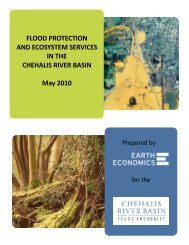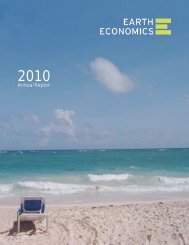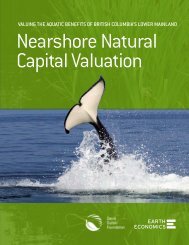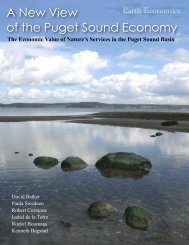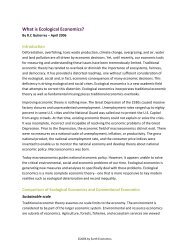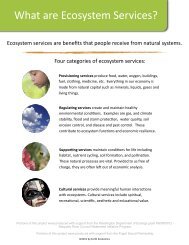The Spot Prawn Fishery: A Status Report - Earth Economics
The Spot Prawn Fishery: A Status Report - Earth Economics
The Spot Prawn Fishery: A Status Report - Earth Economics
Create successful ePaper yourself
Turn your PDF publications into a flip-book with our unique Google optimized e-Paper software.
<strong>The</strong> <strong>Spot</strong> <strong>Prawn</strong> <strong>Fishery</strong>: A <strong>Status</strong> <strong>Report</strong><br />
agement is grounded in a belief that management<br />
will be more effective, and ultimately sustainable, if<br />
all those with an interest in the resource participate<br />
in the development and implementation of natural<br />
resource management policy.<br />
Broadly participatory management systems allow<br />
different knowledge, experiences, and visions to be<br />
incorporated into decision-making. Local or traditional<br />
ecological knowledge can be tapped where<br />
scientific data are incomplete or scarce. <strong>The</strong> equitable<br />
and legitimate participation in decisionmaking<br />
and management ensures that individual<br />
and/or community commitment and belief in the<br />
given resource-management policies and systems<br />
are increased and enhanced. <strong>The</strong> incentive shifts<br />
from maximizing individual gains to maximizing<br />
communal returns. <strong>The</strong> accepted time scale for<br />
returns lengthens and fosters a greater recognition<br />
of the links between ecological systems and economic<br />
systems.<br />
<strong>The</strong> structure of the regime, and the nature and<br />
degree to which management responsibilities are<br />
evenly shared between players, are contextual. <strong>The</strong><br />
dynamics and characteristics of an effective community-based<br />
system necessarily reflect the ecological,<br />
social, political, cultural, and economic conditions<br />
within which it is based. Cooperative or community-based<br />
management has the potential to:<br />
“promote conservation and enhancement of fish<br />
stocks; improve the quality of data and data analysis;<br />
THE MARINE STEWARDSHIP COUNCIL’S PRINCIPLES &<br />
CRITERIA FOR SUSTAINABLE FISHERIES<br />
population to produce longterm<br />
potential yields.<br />
<strong>The</strong> three Principles of the MSC<br />
Standard (See MSC 1998 for complete<br />
details) are the condition of<br />
the fish stock, the impact of the<br />
fishery on the marine environment,<br />
and the fishery management<br />
systems in place. <strong>The</strong>se<br />
Principles are detailed below:<br />
PRINCIPLE 1<br />
A fishery must be conducted in a<br />
manner that does not lead to overfishing<br />
or depletion of the exploited<br />
populations and, for those populations<br />
that are depleted, the fishery<br />
must be conducted in a manner<br />
that demonstrably leads to<br />
their recovery.<br />
Criteria:<br />
1. <strong>The</strong> fishery shall be conducted<br />
at catch levels that continually<br />
maintain the high productivity<br />
of the target population(s) and<br />
associated ecological community<br />
relative to its potential productivity.<br />
2. Where the exploited populations<br />
are depleted, the fishery<br />
will be executed such that<br />
recovery and rebuilding is<br />
allowed to occur to a specified<br />
level consistent with the precautionary<br />
approach and the<br />
ability of the populations to<br />
produce long-term potential<br />
yields within a specified<br />
time frame.<br />
3. Fishing is conducted in a manner<br />
that does not alter the age or<br />
genetic structure or sex composition<br />
to a degree that impairs<br />
reproductive capacity.<br />
PRINCIPLE 2<br />
Fishing operations should allow for<br />
the maintenance of the structure,<br />
productivity, function, and diversity<br />
of the ecosystem (including habitat<br />
and associated dependent and ecologically<br />
related species) on which<br />
the fishery depends.<br />
Criteria:<br />
1. <strong>The</strong> fishery is conducted in a<br />
way that maintains natural functional<br />
relationships among<br />
species and should not lead to<br />
trophic cascades or ecosystem<br />
state changes.<br />
2. <strong>The</strong> fishery is conducted in a<br />
manner that does not threaten<br />
biological diversity at the genetic,<br />
species, or population levels,<br />
and avoids or minimizes mortality<br />
of or injuries to endangered,<br />
threatened, or protected species.<br />
3. Where exploited populations<br />
are depleted, the fishery will be<br />
executed such that recovery and<br />
rebuilding are allowed to occur<br />
to a specified level within specified<br />
time frames, consistent with<br />
the precautionary approach and<br />
considering the ability of the<br />
PRINCIPLE 3<br />
<strong>The</strong> fishery is subject to an effective<br />
management system that respects<br />
local, national, and international<br />
laws and standards and incorporates<br />
institutional and operational<br />
frameworks that require use of the<br />
resource to be responsible and sustainable.<br />
Management System Criteria:<br />
1. <strong>The</strong> fishery shall not be conducted<br />
under a controversial unilateral<br />
exemption to an international<br />
agreement.<br />
<strong>The</strong> management system shall:<br />
2. demonstrate clear long-term<br />
objectives consistent with MSC<br />
Principles and Criteria and contain<br />
a consultative process that is<br />
transparent and involves all interested<br />
and affected parties so as<br />
to consider all relevant information,<br />
including local knowledge.<br />
<strong>The</strong> impact of fishery management<br />
decisions on all those who<br />
depend on the fishery for their<br />
livelihoods, including but not<br />
confined to subsistence, artisinal,<br />
and fishing-dependent communities,<br />
shall be addressed as part<br />
of this process;<br />
3. be appropriate to the cultural<br />
context, scale, and intensity of the<br />
fishery—reflecting specific objectives,<br />
incorporating operational<br />
54



